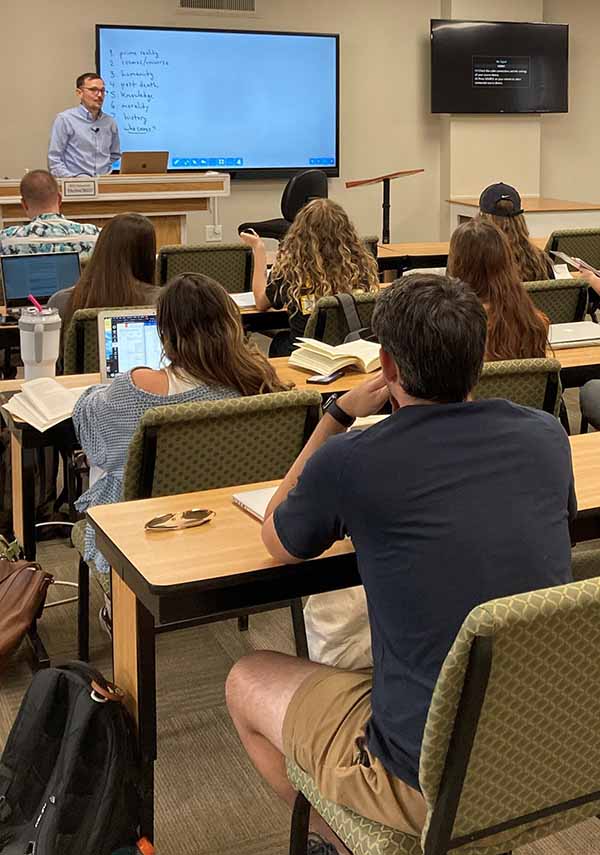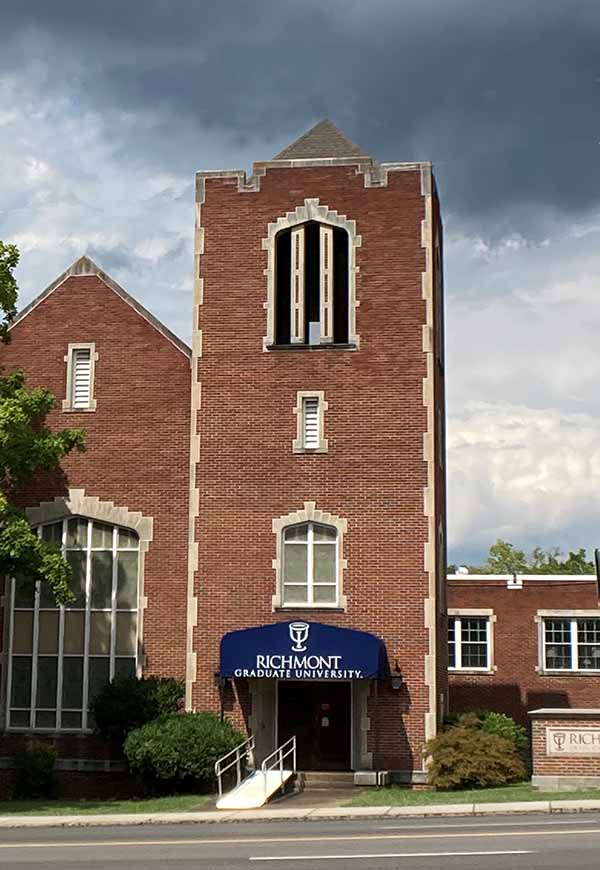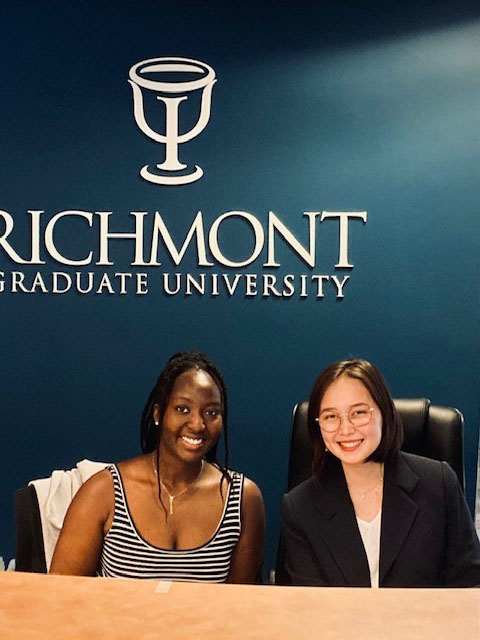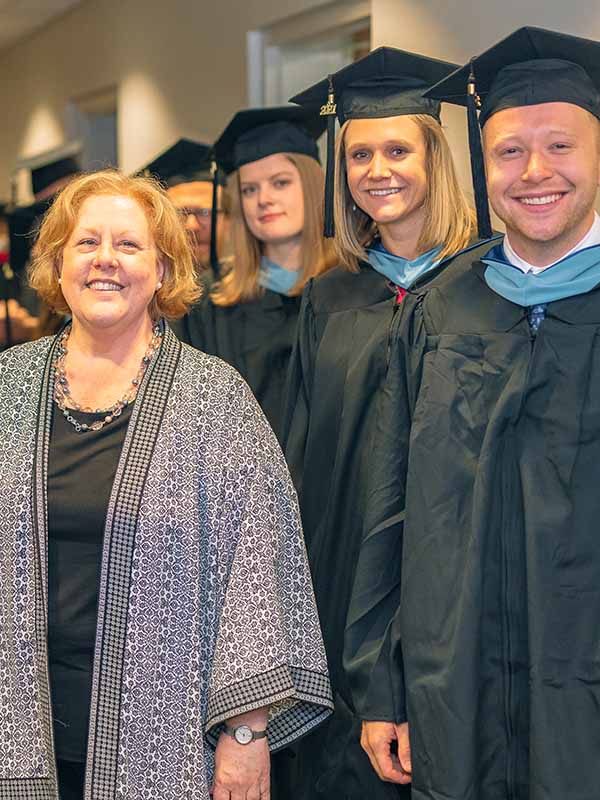Tuition and Financial Aid
Financial Aid 101
Preparing to attend school can be an exciting and hectic time. Add “how am I going to pay for it all?” to the equation, and it can seem a bit overwhelming. But have no fear. This crash course in financial aid will give you options for funding your education. It will also show you that the process is not as difficult as you may think.
First Things First
What do you do first? Your first step is to complete the Free Application for Federal Student Aid (FAFSA) at www.studentaid.gov.
Financial aid officers use the FAFSA to determine how much federal student aid you can receive. Be sure to complete the FAFSA for the academic year that you plan to enroll at Richmont. If you completed the FAFSA application previously, you must submit a renewal FAFSA each year that you plan to receive aid. Also, if you change schools you must include the new school’s Department of Education code. Richmont is located in Tennessee and our code is G33554.
Know Your Options
Once you’ve completed the FAFSA, research potential scholarships and grant money (also known as gift aid). One of the great things about scholarships and grants is that you don’t have to pay them back. Try to exhaust all forms of gift aid before considering any federal or private student loans.
So, where do you look for gift aid? Richmont offers several scholarships. You can find information about these here on the Richmont website – or ask your admissions counselor.
The financial aid office at your current school is also a great place to search, as is the library. Search online for information about scholarships and grants that are available to graduate students. Consider your personal network for scholarship opportunities: your employers, church, civic groups and other community organizations.
Unfortunately, there are no Department of Education grants, such as Pell Grants, for a master’s degree program.
Loan Basics
If you find that you still need money once you’ve fully exhausted all sources of gift aid, don’t worry! There are low-cost loan options available, such as Direct Unsubsidized Loans and private loans.
Direct Unsubsidized Loans
To qualify for Direct Unsubsidized Loans in the Title IV program you must maintain at least 6 credit hours in a degree program during fall and spring semesters. Summer does not count, as we do not have summer loans.
Loan interest starts accruing on the unsubsidized loans from the date of disbursement. If you pay these interest charges as they accrue, you will save a lot of money! Repayment on these loans begins 6 months after you leave school.
Currently, the maximum Direct Unsubsidized Loan amount available to graduate students per academic year is $20,500. This amount is the same for all graduate degree programs throughout the United States regardless of income.
The interest rate for Direct Unsubsidized Loans is currently 6.54% (the interest rate is adjusted every year in July). If you are considering the use of savings or credit cards to pay for tuition/school expenses, this low-rate loan may be a better option for you.
Grad Plus Loans
In addition to the Direct Unsubsidized Loan, the Department of Education offers a Grad PLUS Loan. The Grad PLUS Loan will only cover the shortfall that you have between your Direct Unsubsidized Loan and the Cost of Attendance at Richmont. This is similar to the loans that are available for parents to assist undergraduate students. This loan is credit-based and in some cases may require a co-signer. The Grad PLUS Loan has a slightly higher interest rate (currently 7.54%) than the Direct Unsubsidized Loan, but the repayment plan is the same.
All of the federal loans have an origination fee that is a percentage of the loan disbursement. This fee is deducted from the loan by the Department of Education prior to the funds being disbursed.
Private Loans
Another option to consider is loans from private lenders such as banks, credit unions, etc. By comparing interest rates, fees, and repayment options, you may find a better source for funding your education. These loans are typically credit-based; in some cases, to get the lower rates you may have to have a co-signer. Some private loans can be arranged with repayment plans similar to the federal loans. It is a good idea to research these loans, as some offer lower rates than the Department of Education loans.
By planning ahead, knowing your options, and investing a bit of time and organization, finding free aid and securing funding through student loans is very attainable.
Contact the Richmont financial aid office at financialaid@richmont.edu
Scholarships
Thank you for your interest in the scholarship opportunities offered through Richmont Graduate University. The deadlines to apply for scholarships are October 1 (spring semester) and May 1 (fall semester).
Students may apply for multiple scholarships with one application. As you fill out the Program Information section of the application, scholarship options will populate. The scholarship requirements differ, so make sure you read through them thoroughly before submitting.
To receive a scholarship, you must meet the following criteria:
- Recently accepted or currently enrolled in a degree-seeking program at Richmont
- New students must have completed the application process by October 1 (spring) and May 1 (fall)
- Be a full-time student taking 9 or more hours in fall and spring semesters
- Complete all required items and submit the application by the deadline of October 1 (spring) and May 1 (fall)
You will receive notification regarding your application by November 1 (spring) and June 1 (fall). If you have any questions, please contact your admissions counselor or email admissions@richmont.edu.
The Baird McClure Memorial Scholarship is for students in the Clinical Mental Health Counseling program that have demonstrated financial need and provide evidence of Christian service. Baird McClure was a true Kingdom servant who faithfully served the Chattanooga Bible Institute for many years.
The McClure Scholarship will provide recipients between $1,000 and $5,000 per academic year as determined by the scholarship committee. The maximum amount awarded to a recipient during enrollment at Richmont is $6,000 over a period no longer than three years.
To be considered for this scholarship, specific information must be submitted. Please be aware that the scholarship committee reserves the right to conduct interviews of applicants as deemed appropriate. Please upload the following information for the Baird McClure Scholarship:
- A brief essay detailing ministry experience and Christian service (minimum 500 words)
- Demonstrated financial need (please itemize your annual income and expenses)
- A copy of your Free Application for Federal Student Aid (FASFA), called the SAR report found at studentaid.gov
Note: If there is a discrepancy between your SAR report and your current/future financial situation, you can provide an explanation via the additional upload option below.
The Bridge Scholarship fund was developed to encourage and support diversity at Richmont and in the counseling profession. The scholarship is made available through the generous gifts of Richmont Alumni. The scholarship is awarded annually to one student on the Atlanta campus and one student on the Chattanooga campus. This scholarship will provide recipients $5,000 for one year, with the opportunity to be renewed for an additional year.
To be eligible for the Bridge Scholarship, applicants must be an ethnic minority, be involved in on-campus multicultural activities while a student, and seek to work with diverse and minority populations upon graduation. Applicants must have an undergraduate GPA of 3.0 or higher, and maintain an overall GPA of 3.3 while enrolled at Richmont.
To be considered for this scholarship, specific information must be submitted. Please be aware that the scholarship committee reserves the right to conduct interviews of applicants as deemed appropriate. Please upload the following information for the Bridge Scholarship:
- A brief essay on the importance of mental health counseling in diverse and minority populations (3-5 pages)
- At least one letter of recommendation from either a professor, mentor, or employer. (Those filling out references need to complete the reference form found under the scholarship tab on the Richmont website.)
- Demonstrated financial need (please itemize your annual income and expenses)
- A copy of your Free Application for Federal Student Aid (FASFA), called the SAR report found at studentaid.gov
Note: If there is a discrepancy between your SAR report and your current/future financial situation, you can provide an explanation via the additional upload option below.
Richmont former board member Tina Currin has chosen to honor her mother, Harriet Caldwell, with the Caldwell Scholarship. One student can be awarded up to the maximum of full tuition for up to three years, provided the recipient maintains a 3.0 GPA in the program. The recipient will demonstrate strong Christian character and financial need. Examples of strong Christian character are: ministry participation, mission trips, and acts of service.
To be considered for this scholarship, specific information must be submitted. Please upload the following information for the Harriet Caldwell Scholarship:
- Brief essay on the concepts of healing and wholeness (minimum 750 words)
- Brief essay detailing ministry experience and Christian service (minimum 500 words)
- Demonstrated financial need (please itemize your annual income and expenses)
- A copy of your Free Application for Federal Student Aid (FASFA), called the SAR report found at studentaid.gov
- Letters of recommendation (Those filling out references need to complete the reference form found under the scholarship tab on the Richmont website)
Note: If there is a discrepancy between your SAR report and your current/future financial situation, you can provide an explanation via the additional upload option below.
Scholarship support is available through the Eudokias Foundation for Richmont doctoral students who are pursuing dissertation topics of interest to the Foundation. The Eudokias Foundation fosters spiritual growth and mental well-being by supporting scholarship in the fields of pastoral counseling and Christian counseling. The Foundation is particularly interested in resources and research that equip counselors to put people in touch with God’s love for them, enabling individuals to trust in God’s grace, knowing themselves to be His beloved children.
To apply for scholarship funding…
- Must have a master’s degree in counseling and be a Doctor of Ministry applicant or Doctor of Ministry student within the School of Ministry.
- In 300 words or less, answer the following prompt:
- With consideration of your dissertation, how do you plan to foster spiritual growth and mental well-being in your clinical practice or in ministry?
- $15,000 award amount for 1 recipient
- Award will be distributed in one academic year in the fall, spring and summer semesters ($5,000 ea).
Richmont Graduate University and Fellowship of Christian Athletes has partnered to proudly announce the new offering of two scholarships to be awarded over one academic year to prospective students, supporting the expenses under Richmont’s School of Counseling programs. Applicants must be prospective students studying in Richmont’s School of Counseling. Applicants must also be affiliated with the Fellowship of Christian Athletes and provide documentation of leadership within FCA for the application to be valid: a web link demonstrating employment with FCA will suffice.
As a reflection of the donor, this scholarship is designed to benefit first-year students who show academic merit (3.0 GPA), financial need, a love of Scripture, and a strong desire to serve God through the ministry of helping. Harrison Griffith DeKay scholarships will provide $1,500 per academic year, with a cap of $4,000 over a period no longer than 3 years.
To be considered for this scholarship, specific information must be submitted. Please be aware that the scholarship committee reserves the right to conduct interviews of applicants as deemed appropriate. Please upload the following information for the Harrison Griffith DeKay Scholarship:
- A brief essay on your regard for Scripture (minimum 500 words)
- A brief essay detailing ministry experience and Christian service (minimum 500 words)
- Demonstrated financial need (please itemize your annual income and expenses)
- A copy of your Free Application for Federal Student Aid (FASFA), called the SAR report found at studentaid.gov
Note: If there is a discrepancy between your SAR report and your current/future financial situation, you can provide an explanation via the additional upload option below.
The June Braund Scholarship is designed for the student with interests in gerontological counseling. As our population ages, the needs of our senior citizens become ever more prominent in our society. This scholarship will provide $5,000 per academic year, with a cap of $15,000 over a 3-year period.
In addition to financial assistance, the recipient will be privileged to be mentored by Dr. Ron Braund, the scholarship donor, counseling entrepreneur, and PSI/Richmont alumnus. Dr. Braund will offer his experience to the recipient as the student grows professionally and personally in the field of gerontological psychotherapy.
The recipient must complete a combination of educational experiences during his/her time at Richmont, including:
(1) Two masters-level courses in gerontology (either through independent study or enrollment at an accredited graduate school in the local area),
(2) approximately 5 hours per week with service groups, individuals or families dealing with Alzheimer’s or choosing an internship outplacement that works directly with this population.
To be considered for this scholarship, specific information must be submitted. Please be aware that the scholarship committee reserves the right to conduct interviews of applicants as deemed appropriate. Please upload the following information for the June Braund Scholarship:
- Brief essay detailing your desire to do gerontological counseling. (minimum 500 words)
- Demonstrated financial need (please itemize your annual income and expenses)
- A copy of your Free Application for Federal Student Aid (FASFA), called the SAR report found at studentaid.gov
Note: If there is a discrepancy between your SAR report and your current/future financial situation, you can provide an explanation via the additional upload option below.
This scholarship was recently endowed by a generous donor. This scholarship is specifically for Chattanooga students who are pursuing a master’s degree in Clinical Mental Health Counseling at Richmont. This scholarship is designed for students who demonstrate financial need and academic promise (3.0 GPA). Recipients will be awarded up to $1,500 tuition assistance per academic year over a period no longer than 3 years.
To be considered for this scholarship, specific information must be submitted. Please be aware that the scholarship committee reserves the right to conduct interviews of applicants as deemed appropriate. Please upload the following information for the Malone Scholarship:
- Demonstrated financial need (please itemize your annual income and expenses)
- A copy of your Free Application for Federal Student Aid (FASFA), called the SAR report found at studentaid.gov
Note: If there is a discrepancy between your SAR report and your current/future financial situation, you can provide an explanation via the additional upload option below.
This scholarship is specifically for Chattanooga students who demonstrate a financial need and a desire to work in an inner-city ministry upon the completion of their graduate studies.
To be considered for this scholarship, specific information must be submitted. Please be aware that the scholarship committee reserves the right to conduct interviews of applicants as deemed appropriate. Please upload the following information for the Mary and Windy Willingham & Ann Rollinson Scholarship:
- A brief essay detailing your desire to work with an inner-city ministry (minimum 500 words)
- Demonstrated financial need (please itemize your annual income and expenses)
- A copy of your Free Application for Federal Student Aid (FASFA), called the SAR report found at studentaid.gov
Note: If there is a discrepancy between your SAR report and your current/future financial situation, you can provide an explanation via the additional upload option below.
The Paul L. Walker scholarship is awarded to students who show the highest level of academic and professional potential, including undergraduate GPA of 3.5 or better and program of study must include the completion of a thesis.
Two awards will be given annually for this scholarship of a maximum of $10,000 over a period no longer than 3 years.
To be considered for this scholarship, specific information must be submitted. Please be aware that the scholarship committee reserves the right to conduct interviews of applicants as deemed appropriate. Please upload the following information for the Paul L. Walker Scholarship:
- Evidence of research potential (please upload an academic research sample)
- A brief essay detailing ministry experience and Christian service (minimum 500 words)
- Resume detailing education, academic research, achievements, honors, etc.
- Letters of recommendation (Those filling out references need to complete the reference form found under the scholarship tab on the Richmont website.)
The Presidential Honors Scholarship is awarded to students who excelled academically in their undergraduate degree. To qualify applicants must have achieved a cumulative undergraduate GPA of 3.85 or above. Applicants must be accepted into Richmont’s Master of Arts in Clinical Mental Health Counseling program and be starting classes in the fall. Recipients of this scholarship will receive $3000 toward their first year at Richmont.
The School of Ministry Scholarship is available for full-time students pursuing the M.A. in Ministry or the M.A. in Spiritual Formation and Direction. The scholarship will be awarded on the basis of an assessment of financial need taken together with indicators of potential for effectiveness in ministry.
To be considered for this scholarship, specific information must be submitted. Please be aware that the scholarship committee reserves the right to conduct interviews of applicants as deemed appropriate. Please upload the following information for the School of Ministry Scholarship:
- In regard to your program of study, write a brief essay on your personal and career goals and how this scholarship is important to your course of study (500 word limit)
- Demonstrated financial need (please itemize your annual income and expenses)
- A copy of your Free Application for Federal Student Aid (FASFA), called the SAR report found at studentaid.gov
Note: If there is a discrepancy between your SAR report and your current/future financial situation, you can provide an explanation via the additional upload option below.
Richmont Graduate University and Young Life have partnered to proudly announce the new offering of two scholarships to be awarded over one academic year to prospective students, supporting the expenses under Richmont’s School of Counseling programs. Applicants must be prospective students studying in Richmont’s School of Counseling. Applicants must also be affiliated with Young Life and provide documentation of leadership within Young Life for the application to be valid: a web link demonstrating employment with Young Life will suffice.
Graduate Assistant / College Work Study Program
Richmont’s College Work Study (CWS) Program provides financial support and training to degree-admitted graduate students, as Richmont qualifies to fund these positions as part of the Department of Education’s Title IV Loan Program. Students must meet the requirements of the Department of Education Title IV Loan Program. Applications are typically made during the summer prior to initial enrollment; however, positions may be filled during the academic year when available. The dean of students is responsible for advertising open CWS positions.
CWS students are assigned to and supervised by a Richmont faculty or staff member. A wide variety of administrative and clerical duties are performed with participants being paid an hourly stipend. Students work 150 hours during both the fall and spring semesters and approximately 120 hours during the summer semester. The average is 10 hours per week.
Following are the requirements for participation in the CWS program:
M.A. PROGRAM
- 6 hours per semester of academic coursework for the fall and spring semesters
- Must be enrolled in the summer semester
M.S. PROGRAM
- 6 hours per semester of academic coursework
If you would like to apply for the GA/CWS program, please complete the application and return it to:
Richmont Admissions Office
1900 The Exchange SE
Building 100
Atlanta, GA 30339
If you have questions regarding this program, please contact: Roxanne Shellabarger, rshellabarger@richmont.edu
Veterans’ Benefits and Veteran Readiness and Education
Richmont is approved for the training of veterans and vocational rehabilitation students as an accredited training institution. Those who are qualified for educational benefits under these programs should contact their nearest Department of Veterans Affairs or Veteran Readiness and Education office for more information.
Veterans and other eligible persons are required to attend classes in order to be eligible for educational benefits under these programs. Richmont is required to report promptly to the VA or Veteran Readiness and Education offices any changes in enrollment, non-class attendance, or withdrawal from the institution.
Recipients may not receive benefits for any course that does not fulfill the requirements for their stated degree and program of study. Audited courses, non-credit courses, and correspondence work cannot be certified.
Cost of Attendance
Below are tables displaying all programs of study in our 12 School of Counseling programs and 6 School of Ministry programs to help students see the total cost of attendance for each of Richmont’s degree and certificate programs.
The actual total cost of the program depends on many factors, including the actual number of hours, duration of the program, and any cost changes. The below table is designed to give students an estimated cost based on the figure provided. Travel expenses, supplies, and books are not included in these estimated costs.
- School of Counseling
- School of Ministry
Master of Arts in Clinical Mental Health Counseling
Estimated Costs MACMHC — 3-Year, 67-Hour Program
| Type of Costs | Amount | Multiplier | Total |
|---|---|---|---|
| Tuition | $740 | per credit hour | $49,580 |
| Application Fee | $50 | one-time fee | $50 |
| Library Fees | $50 | per semester | $400 |
| Student Fees | $75 | per semester | $600 |
| Technology Fee | $215 | per semester | $1,720 |
| Applied Practicum Fee | $100 | one-time fee | $100 |
| Supervision Assist Fee | $200 | one-time fee | $200 |
| Graduation Fee | $155 | one-time fee | $155 |
| Total | $51,309 | ||
Master of Science in Pastoral Care
Estimated Costs MSPC&I — 2-Year, 32-Hour Program
| Type of Costs | Amount | Multiplier | Total |
|---|---|---|---|
| Tuition | $740 | per credit hour | $23,680 |
| Application Fee | $50 | one-time fee | $50 |
| Library Fees | $50 | per semester | $250 |
| Student Fees | $75 | per semester | $375 |
| Technology Fee | $215 | per semester | $1,075 |
| Graduation Fee | $155 | one-time fee | $155 |
| Total | $24,894 | ||
Graduate Certificates
$740 per credit hour
Additional Fees May Apply
| Type of Costs | Amount | Multiplier |
|---|---|---|
| Audit Tuition for the School of Counseling | $370 | per credit hour |
| Schedule Change Fee (add/drop) | $10 | per transaction |
| Independent Study Fee | $100 | per credit hour |
| Late Registration Fee | $50 | per transaction |
| Late Payment Fee | $50 | per transaction |
| Late Graduation Fee | $75 | one-time fee |
| Replacement Diploma Fee | $50 | one-time fee |
| Transcript Evaluation Fee | $10 | per transcript |
| Transcript Fee | $12 minimum | per transcript |
| Expedited Transcript Fee | $10 | per transcript |
| Overnight Transcript Delivery | $30 | per transcript |
| CPCE Examination Fee | set by the National Board for Certified Counselors (NBCC) | |
| NCC Application Fee | set by the National Board for Certified Counselors (NBCC) | |
Doctor of Ministry (DMIN)
Estimated Costs DMIN — 3-Year, 33-Hour Program
| Type of Costs | Amount | Multiplier | Total |
|---|---|---|---|
| Tuition | $700 | per credit hour | $23,100 |
| Application Fee | $50 | one-time fee | $50 |
| Library Fees | $50 | per semester | $300 |
| Student Fees | $75 | per semester | $450 |
| Technology Fee | $215 | per semester | $1,290 |
| Continued Relations Fee | $700 | one-time fee | $700 |
| Graduation Fee | $155 | one-time fee | $155 |
| Total | $26,045 | ||
Master of Arts in Ministry (MAMIN)
Estimated Costs MAMIN — 2-Year, 40-Hour Program
| Type of Costs | Amount | Multiplier | Total |
|---|---|---|---|
| Tuition | $543 | per credit hour | $21,720 |
| Application Fee | $50 | one-time fee | $50 |
| Library Fees | $50 | per semester | $200 |
| Student Fees | $75 | per semester | $300 |
| Technology Fee | $215 | per semester | $860 |
| Graduation Fee | $155 | one-time fee | $155 |
| Total | $23,285 | ||
Master of Arts in Ministry – Anglican Studies Concentration (MAMINAS)
Estimated Costs MAMINAS — 2- or 3-Year, 33-Hour Program
| Type of Costs | Amount | Multiplier | Total |
|---|---|---|---|
| Tuition | $543 | per credit hour | $17,919 |
| Application Fee | $50 | one-time fee | $50 |
| Orientation Fee | $50 | one-time fee | $50 |
| Library Fees | $50 | per semester | $250 - $400 |
| Student Fees | $75 | per semester | $375 – $600 |
| Technology Fee | $215 | per semester | $1,075 – $1,720 |
| Graduation Fee | $155 | one-time fee | $155 |
| Books | $400 – $600 | per semester | $2,000 – $4,800 |
| Total | $21,308 – $25,128 | ||
Master of Arts in Spiritual Formation and Direction (MASFD) – 3
Estimated Costs MASFD — 2-Year, 40-Hour Program
| Type of Costs | Amount | Multiplier | Total |
|---|---|---|---|
| Tuition | $543 | per credit hour | $21,720 |
| Application Fee | $50 | one-time fee | $50 |
| Orientation Fee | $50 | one-time fee | $50 |
| Library Fees | $50 | per semester | $250 |
| Student Fees | $75 | per semester | $375 |
| Technology Fee | $215 | per semester | $1,075 |
| Lodging and Meals for Retreats | $150 | per night | $1,950 |
| Graduation Fee | $155 | one-time fee | $155 |
| Total | $24,940 | ||
Graduate Certificate in Anglican Studies (GCAS)
Estimated Costs GCAS — 2-Year, 15-Hour Program
| Type of Costs | Amount | Multiplier | Total |
|---|---|---|---|
| Tuition | $543 | per credit hour | $8,145 |
| Application Fee | $50 | one-time fee | $50 |
| Orientation Fee | $50 | one-time fee | $50 |
| Library Fees | $50 | per semester | $200 |
| Student Fees | $75 | per semester | $300 |
| Technology Fee | $215 | per semester | $860 |
| Residency Room & Board | $490 | per residency x 4 (estimate) | $1,950 |
| Personal Spiritual Director | $50 | per month x 20 (estimate) | $1,000 |
| Supervision Fee | $75 | per session x 6 (estimate) | $450 |
| Books | $200 | per semester (estimate) | $1,000 |
| Travel Arrangements | Amounts will vary | ||
| Certificate Fee | $50 | one-time fee | $50 |
| Total | $14,140 | ||
Graduate Certificate in Spiritual Direction (GCSD) – 4
Estimated Costs GCSD — 2-Year, 15-Hour Program
| Type of Costs | Amount | Multiplier | Total |
|---|---|---|---|
| Tuition | $367 | per credit hour | $5,505 |
| Application Fee | $50 | one-time fee | $50 |
| Library Fees | $50 | per semester | $250 |
| Student Fees | $75 | per semester | $375 |
| Technology Fee | $215 | per semester | $1,075 |
| Lodging and Meals for Retreats | $150 | per night | $1,950 |
| Certificate Fee | $50 | one-time fee | $50 |
| Total | $9,255 | ||
Additional Fees May Apply
| Type of Costs | Amount | Multiplier |
|---|---|---|
| Audit Tuition for the School of Ministry (Master) | $271.50 | per credit hour |
| Schedule Change Fee (add/drop) | $10 | per transaction |
| Independent Study Fee | $100 | per credit hour |
| Late Registration Fee | $50 | per transaction |
| Late Payment Fee | $50 | per transaction |
| Late Graduation Fee | $75 | one-time fee |
| Replacement Diploma Fee | $50 | one-time fee |
| Transcript Evaluation Fee | $10 | per transcript |
| Transcript Fee | $12 minimum | per transcript |
| Expedited Transcript Fee | $10 | per transcript |
| Overnight Transcript Delivery | $30 | per transcript |






